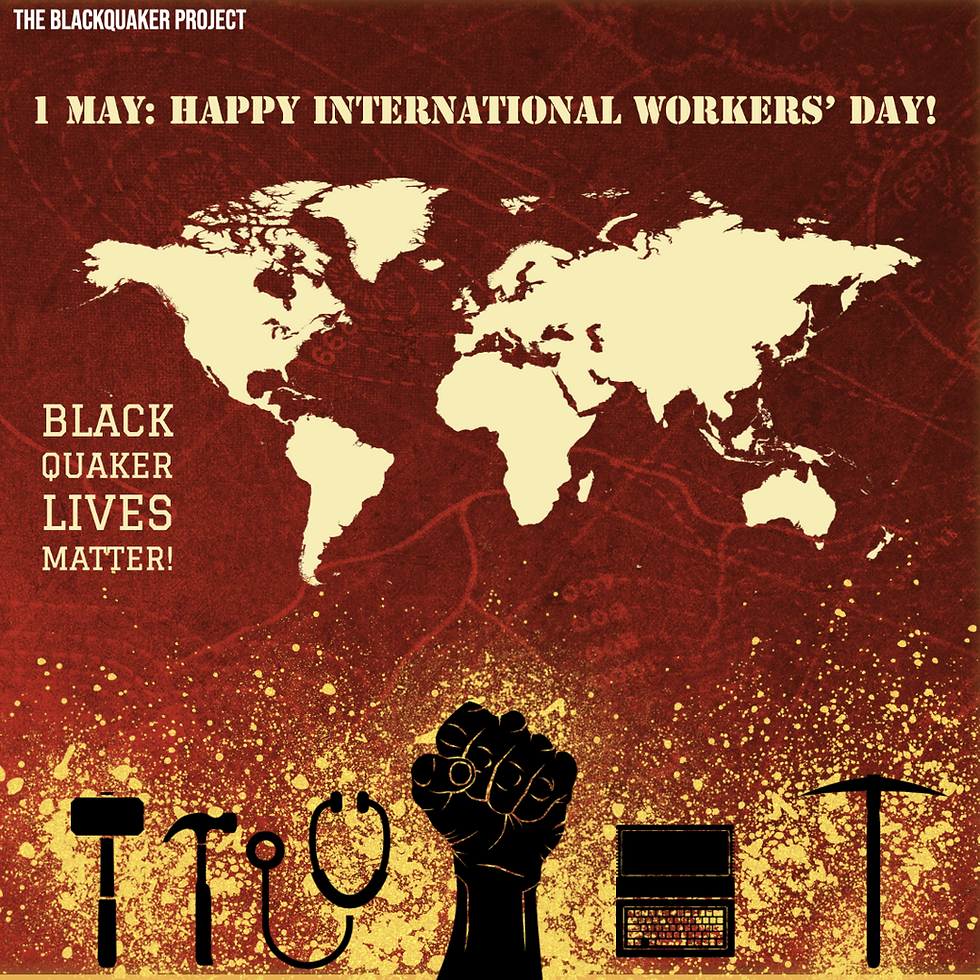1 May Happy International Workers'Day!
- Timothy Vaughn

- Apr 30, 2021
- 3 min read

“...I fail to see how the movement can be victorious in the absence of radical programs for full employment, abolition of slums, the reconstruction of our educational system, new definitions of work and leisure. Adding up the cost of such programs, we can only conclude that we are talking about a refashioning of our political economy.”
Bayard Rustin, “From Protest to Politics” in Harold D. Weaver, Jr., “Bayard Rustin (1912 -1987),” in Weaver, Kriese, and Angell, eds., Black Fire: African American Quakers on Spirituality and Human Rights (Philadelphia: Quaker Press of Friends General Conference, 2011), pp. 164-176.
The BlackQuaker Project recognizes 1 May as International Workers’ Day and the struggles of labor movements, trade unions, and the working class around the world for dignity, decent wages, and basic human rights. Though commonly known as May Day, the holiday is also referred to as Labor Day--depending on the country-- and is celebrated as a holiday on 1 May worldwide, with the few exceptions of the USA, Canada, and several others.
While Labor Day originated as a commemoration of the 4 May 1886 Haymarket Affair, in which police clashed with peaceful protesters during a rally in Chicago for an eight-hour workday, its historical roots extend across the world as a cherished international holiday. In China, this year citizens will take 5 consecutive days off from work. In Chile, storefronts and public services close for an entire day of rallies, festivals, and cookouts organized by trade unions. In Kenya, the country with the largest number of Quakers, the minimum wage may be incrementally increased; celebrations are held in Uhuru Park, Nairobi; and addresses are delivered by the Chairman of the Organization of Trade Unions (COTU), the Minister of Labor, and the President of the nation.
In Bolivia, which has the 4th highest number of Quakers in the world, Labor Day has been celebrated since 1906. However, it did not become a major public holiday until the Bolivian National Revolution of 1952. Over the course of that year the Nationalist Revolutionary Movement (MNR), a political party sponsored by a coalition of indigenous farmers and miners, seized political power in the culmination of a decades-long struggle for worker autonomy and social democratic reforms. Today, parades, marches, and fairs are held in celebration of Labor Day.
During Workers’ Day in South Africa, trade unions and labor movements are honored for their resistance against Apartheid. The holiday first became tied to anti-Apartheid sentiment in 1950 after police violence claimed 18 lives during a strike led by the South African Communist Party on 1 May in response to the Suppression of Communism Act.
Mexico has formally celebrated Labor Day since 1 May 1923, commemorating events such as the Cananea Strike of 1906. The strike was led by indigenous coal miners from the town of Cananea in Sonora State, who, aggrieved by the greater financial compensation given to American Workers (who were imported by the USA-based Cananea Consolidated Copper Company) struck for better pay, removal of abusive supervisors, and a higher quota of jobs guaranteed to Mexicans. While these demands were not met, the strike helped generate unrest that would lead to the Mexican Revolution in 1910.
What personal significance does Labor Day hold for you in your country? Why is Labor Day celebrated in the USA in September and not on 1 May as in most countries? Why is the USA out of step with most of the world in celebrating Labor Day? Write to us at theblackquakerproject@gmail.com with your comments and questions.
Please sign up to our mailing list to follow our ongoing work, including the expanding Quakers of Color International Archive.



Comments